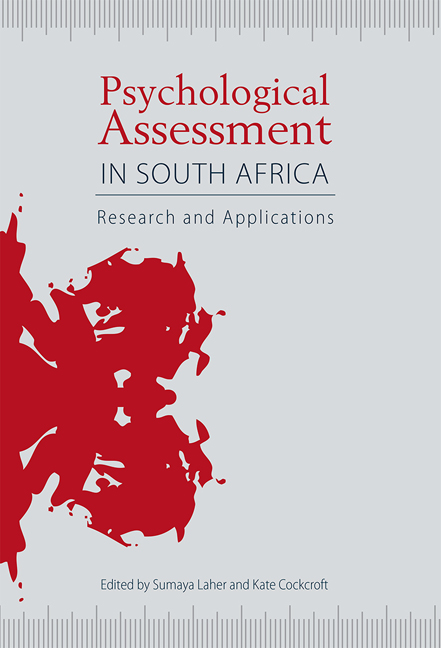Book contents
- Frontmatter
- Contents
- Tables and figures
- Acknowledgements
- Acronyms and abbreviations
- 1 Contextualising psychological assessment in South Africa
- Section One Cognitive tests: conceptual and practical applications
- Section Two Personality and projective tests: conceptual and practical applications
- 14 The Sixteen Personality Factor Questionnaire in South Africa
- 15 Using the Fifteen Factor Questionnaire Plus in South Africa
- 16 The Basic Traits Inventory
- 17 The Myers-Briggs Type Indicator® in South Africa
- 18 The NEO-PI-R in South Africa
- 19 Using the Occupational Personality Profile in South Africa
- 20 The Occupational Personality Questionnaire
- 21 The Millon Inventories in South Africa
- 22 Assessment and monitoring of symptoms in the treatment of psychological problems
- 23 Assessment in routine clinical and counselling settings
- 24 Projective assessment of adults and children in South Africa
- 25 The use of the Children's Apperception Test and Thematic Apperception Test in South Africa
- 26 Projective assessment using the Draw-A-Person Test and Kinetic Family Drawing in South Africa
- 27 The Rorschach in South Africa
- Section Three Assessment approaches and methodologies
- Contributors
- Index
16 - The Basic Traits Inventory
from Section Two - Personality and projective tests: conceptual and practical applications
Published online by Cambridge University Press: 21 April 2018
- Frontmatter
- Contents
- Tables and figures
- Acknowledgements
- Acronyms and abbreviations
- 1 Contextualising psychological assessment in South Africa
- Section One Cognitive tests: conceptual and practical applications
- Section Two Personality and projective tests: conceptual and practical applications
- 14 The Sixteen Personality Factor Questionnaire in South Africa
- 15 Using the Fifteen Factor Questionnaire Plus in South Africa
- 16 The Basic Traits Inventory
- 17 The Myers-Briggs Type Indicator® in South Africa
- 18 The NEO-PI-R in South Africa
- 19 Using the Occupational Personality Profile in South Africa
- 20 The Occupational Personality Questionnaire
- 21 The Millon Inventories in South Africa
- 22 Assessment and monitoring of symptoms in the treatment of psychological problems
- 23 Assessment in routine clinical and counselling settings
- 24 Projective assessment of adults and children in South Africa
- 25 The use of the Children's Apperception Test and Thematic Apperception Test in South Africa
- 26 Projective assessment using the Draw-A-Person Test and Kinetic Family Drawing in South Africa
- 27 The Rorschach in South Africa
- Section Three Assessment approaches and methodologies
- Contributors
- Index
Summary
The emergence of the Five-Factor Model (FFM) of personality sparked an extensive amount of research in the area of personality theory and assessment. The FFM presents a structure for personality that is best described by five global domains or factors that characterise individual differences. These five domains are generally called Extraversion, Neuroticism, Openness to Experience, Agreeableness and Conscientiousness (Church, 2000; Costa & McCrae, 2008). This model is not based on any single theory of personality, and numerous factor analyses of existing personality instruments have returned very similar structures to that of the five factors (Allik & McCrae, 2004; McCrae, Terracciano & 79 Members of the Personality Profiles of Cultures Project, 2005).
The FFM of personality has its roots in the research that was done using the lexical approach to personality description. The lexical hypothesis assumes that most notable individual differences that are also socially relevant will become encoded as single words in natural language (Goldberg, 1990). In other words, the terms that are used in describing personality in this model are also the terms that people would use in everyday language in order to describe themselves and others. This research was followed by the development of the question- naire tradition, which was led primarily by work on the NEO personality inventories as well as the work of Costa and McCrae (McCrae & Allik, 2002; Rolland, 2002).
The development of the Basic Traits Inventory (BTI) started in 2002, at which time no South African trait-based personality inventories were available. Taylor and De Bruin (2006) decided to create a new personality instrument for South Africa, using the FFM that has been shown to have cross-cultural applicability throughout the world (see McCrae et al., 2005). Some of the advantages of using this model as a framework are that it integrates a wide array of personality constructs, making it possible for researchers across different fields of study to communicate easily; it is comprehensive, providing a means to study relations between personality and other phenomena; and it is efficient, as it offers at least a global description of personality (McCrae & Costa, 2008). There is also a large body of evidence suggesting that the model can be applied successfully in different cultures (see Laher, 2008; 2011; McCrae et al., 2004; McCrae et al., 2005).
- Type
- Chapter
- Information
- Psychological Assessment in South AfricaResearch and Applications, pp. 232 - 243Publisher: Wits University PressPrint publication year: 2013



